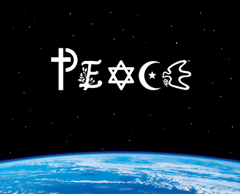Is god just a convenience store item?
Job Description: "Answer all the questions that we can't answer yet". 
Yet another curious coincidence in my on-going world of simultaneous events unfolds itself. Again, last night, I lay awake, feeling a compelling urge to respond, question, or react in some manner to something Jay said at the end of his podcast yesterday. First, though, I neeed tell you that I included the quote under that Einstein picture in a reply I made yesterday to a fellow blogger who adds comments to my blogs periodically. Later that same day, I checked in on Jay's weekly podcast, and noticed it was titled "Einstein's Brain"!. Extraordinarily, I just now went back to retrieve the link to my comment shown above, and found that Gary has already written his next entry, titled "The nothingness of Mu", wherein he ponders about finding himself "forever in a state that is not unlike that of the practitioner of Zen Buddhism, seeking my true nature.". Dave, the fellow who interviews Jay each week, has recently been moving himself towards the beliefs and philosophy of Zen Buddhism, and talked about his journey there just a few weeks ago in his blog. Serendipity?
All this because again I didn't sleep last night; Jay's comments made at the end of his discussion on his podcast kept running circles in my mind. Essentially (as you heard, if you just re-played it up above), he says that as a scientist he prefers data, and his understandable bias is to investigate the investigatable. It was his last statement that got to me though. He said, "It might turn out in the fullness of time that science won't provide the answers, and faith in god might provide those that are missing".
That raises several red flags for me (and let me make it clear, I'm not a scientist, I never did particularly well in the sciences at school, I respect Jay very much, have met him once, and haven't read his book....yet!)
Firstly, the concept of having god to function just to fill in the missing pieces (with the implication that as we figure another piece out, we'll take it from his burden pile), seems to create a fractious god, which in my mind goes against any image of god I've heard, read or talked about. It reminds me of a conversation I had once with a four-year-old nephew who, looking out a window on a dark, starry night asked me (I was about 19 at the time, I think) what was "past the stars", and I replied "space". He said "I know that! I mean what's past everything", and I said, "Well, no one really knows", to which he replied, as only an innocent four-year-old could, "Well, God knows, doesn't he?". I found it profound that a four-year-old would have that kind of grasp, but at the same time, that's when I started doubting that the god of my church made any sense to me. That's when I started using him for convenience to answer what I couldn't figure out
(click on cartoon to enlarge--oops, it doesn't enlarge! It's a picture of a person standing in front of a mouse, while the photographer says 'Cheese'...pretty cheesy, eh?!)
In government, there's a word for making a 'Call For Tender' so specific that everyone knows in advance who's going to get the contract for political purposes. I forget the word, but it rhymes with 'cheating'. That's a bit how I feel with the fill in the blanks version of god. There are three reasons why that view let's me down. First, it implies there is no god within a scientific context, yet god in a god context is 'everywhere'. Is it possible to deny that it was god's doing that raised tens of thousands of dollars in a weekend for a boy in Afghanistan who has a cancer the size of a baseball on his face and certainly won't live much longer? Without god bringing the church congregation together, a member of which is serving as a soldier in Khanduhar right now and appealed back to his church for help, that boy's life would be practically, actually different. Or is there a radical distinction to be made between the existence of god, and human faith in the existence of god.
Secondly, by excluding god as a factor in scientific discovery, it has to put into question all of the "all else being equal", experiment-replication, double-blind testing situations which scientists use to draw their conclusions. Thirdly, it assumes that science is forever making true forward progress, in which case I should have had my skull cut open and bled for being bipolar, and Columbus should have dropped off the edge, and Einstein should have been locked up as schizoid. And what of Freud?
Now, in fairness, Jay did say, "it might turn out in the fullness of time......". Which says to me, "It's a non-god problem. WE've gotcha covered on this one until we solve it or show that we can't, in which case it's all yours, big buddy!" Look, I don't mean to make light of either jay or god, but the reason this resonates with me so much is that during my first year away from home, while at Waterloo University, the My Lai massacre took place in Viet Nam, and yes, I had been brought up in a non-questioning faith-based household. When things like that happen, when your dormmates are draft-dodgers, and you're at the peak of your idealistic years, you start to question. 
So, when I was home at Christmas, I went in to chat with our minister about a lot of things, and left unsatisfied, and unfulfilled. He was an incredible minister, delivered powerful and thought-provoking sermons each week, some of whic I still remember the gist of some 35 years later, but he never filled that hole.
So Jay says, "...in the fullness of time...". When will that be, I wonder? Who gets to decide? And how? And when? Fascinating stuff, this!
Today's PEACE link is titled "Celebrating the Wisdom of God's Time, God's People, God's Peace. It's actually a resource page for churches, for peace Sunday 2005, but some of the links are kinda funky, like "Mug Someone for Peace".












Rick, I always liked something the actor Henry Winkler said about God: "I'm convinced there is a higher consciousness, though I don't necessarily mean God. I have a theory that God is actually the subconscious. God is unknown and so is the subconscious. The two are linked together. When a person meets his potential -- and I don't think any man can do it in his lifetime -- then he'll meet God."
A nice "Freudian" viewpoint, I think -- though Freud, of course, was an atheist.
Posted by My Daily Struggles |
9:57 a.m.
My Daily Struggles |
9:57 a.m.
That four-year old nephew had it right, I think... (true, I'm biased) in the sense that we may as well use the word "God" to refer to that which is beyond all our understanding; what I call "the ineffable" in my conversations with Jay.
That said, I think from a human point of view, "faith in God" is virtually indistinguishable from God, at least from the point of view of any given individual and so far as we can tell.
By this I don't mean to imply that God is limited to faith; rather, that faith is a window to whatever infinity God (see "the ineffable" aboive) represents. Moreover, if you remove faith from a given person, God essentially ceases to exist for that person, although others, via the lens of faith, may still see God at work in that person's life (though no two observers will see the same thing).
The radical subjectivity of divinity is really hard for Western folk to grasp. After all, our concept of God owes a great deal to the the Roman Empire and the feudal system.... "top down" organizations to the max.
I like George Harrison's words: "life goes on within you and without you." Substitute "God" for "life" (or "faith") and it still works.
Posted by David Newland |
10:31 a.m.
David Newland |
10:31 a.m.
"Science without religion is lame. Religion without science is blind."
-Albert Einstein
I'm no longer as 'freaked out' by this sort of thing, since it's happening so regularly to me now, but I came across this quote on a site quite by accident this afternoon, when I was searching for something totally different that I want to write about tomorrow.
It is serendipity! Case closed! Perhaps now I move the question up to the level "is it god's hand at work?"
Thanks for the comments.
Posted by Evydense |
1:27 p.m.
Evydense |
1:27 p.m.
Post a Comment